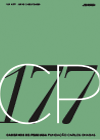Education and democracy: from the risk of disarticulation to a critical recomposition
Keywords:
Education, Democracy, SchoolsAbstract
Returning to a theme that is a classic in the theory of education, this article seeks grounded answers to a current problem: the erosion of the relationship between education and democracy and the risk of witnessing, if nothing is done, a disarticulation of both in the contexts where neoliberalization has taken economization of spheres and activities further, including those not directly economic. Focused on school institutions, and based on a careful analysis of this phenomenon, the article points to a critical recomposition of the alignment between education and democracy, specifying what this implies in the educational path of the youngest in the really existing schools.
Downloads
References
APPADURAI, Arjun. O cansaço da democracia. In: GEISELBERGER, Heinrich (ed.). O grande retrocesso. Lisboa: Objectiva, 2017. p. 17-31.
APPLE, Michael. Creando educación democrática en tiempos neoliberales y neoconservadores. Praxis, La Pampa, Argentina, n. 17, p. 27-35, 2013.
BARBOSA, Manuel. Educação e desafios da multiculturalização: uma pedagogia da sociedade civil. Cadernos de Pesquisa, São Paulo, v. 40, n. 141, p. 993-1023, set./dez. 2010.
BARCENA, Fernando. La re-politización del discurso cívico: una mirada filosófica. In: REVILLA, Fidel (coord.). Educación y ciudadanía: valores para una sociedad democrática. Madrid: Biblioteca Nueva, 2006. p. 75-79.
BAUMAN, Zygmunt. Modernidad líquida. México: Fondo de Cultura Económica, 2003.
BROWN, Wendy. Les habits neufs de la politique mondiale: néolibéralisme et néo-conservatisme. Paris: Les Prairies Ordinaires, 2007.
BROWN, Wendy. El pueblo sin atributos: la secreta revolución del neoliberalismo. Barcelona: Malpaso, 2016.
CALISKAN, Koray; CALLON, Michel. Economization, part 1: Shifting attention from the economy towards processes of economization. Economy and Society, v. 38, n. 3, p. 369-398, Aug. 2009.
CAMPS, Victoria. Democracia sin ciudadanos: la construcción de la ciudadanía en las democracias liberales. Madrid: Trotta, 2010.
CHOMSKY, Noam. Entretanto, tudo corre bem aos ricos e poderosos. In: CHOMSKY, Noam; POLYCHRONIOU, Chronis (ed.). Otimismo e não desespero. Amadora: Elsinore, 2017. p. 82-89.
CHURCHILL, Winston. House of Commons, 11 November 1947. Disponível em: https://winstonchurchill.org/resources/quotes/the-worst-form-of-government/. Acesso em: 17 fev. 2020.
CROUCH, Colin. Posdemocracia. Madrid: Taurus, 2004.
DAHRENDORF, Ralf. Después de la democracia. Barcelona: Crítica, 2002.
DEWEY, John. Democracia e educação. Lisboa: Didáctica, 2007.
DÍEZ GUTIÉRREZ, Enrique. La revuelta educativa “neocon”. Gijón: Trea Ensayos, 2019.
EATWELL, Roger; GOODWIN, Matthew. Nacionalpopulismo: por qué está triunfando y de qué forma es un reto para la democracia. Barcelona: Península, 2019.
EUROPEAN COMMUNITIES. A memorandum on lifelong learning. Brussels: Comission of the European Communities, 2000.
EUROPEAN COMMUNITIES. It is always good time to learn. Brussels: Comission of the European Communities, 2007.
FASSIN, Éric. Populismo de izquierdas y neoliberalismo. Barcelona: Herder, 2018.
FEHER, Michel. S’apprécier, ou les aspirations du capital humain. Raisons Politiques, n. 28, p. 11-31, nov. 2007.
FERNÁNDEZ LIRIA, Carlos; GARCÍA FERNÁNDEZ, Olga; GALINDO FERRÁNDEZ, Enrique. Escuela o barbárie: entre el neoliberalismo salvaje y el delirio de la izquierda. Madrid: Akal, 2017.
FINCHELSTEIN, Federico. Do fascismo ao populismo na história. Lisboa: Edições 70, 2019.
FOA, Roberto; MOUNK, Yascha. The democratic disconnect. Journal of Democracy, v. 27, n. 3, p. 5-17, 2016.
FOA, Roberto; MOUNK, Yascha. The signs of deconsolidation. Journal of Democracy, v. 28, n. 1, p. 5-15, 2017.
FOUCAULT, Michel. Naissance de la biopolitique. Gallimard: Paris, 2004.
FREEDOM HOUSE. Freedom in the world: democracy in crisis. Freedom House, 2018. Disponível em: https://freedomhouse.org/sites/default/files/FH_FITW_Report_2018_Final_SinglePage.pdf. Acesso em: 7 fev. 2020.
GUILHERME, Manuela. Is there a role for critical pedagogy in language/culture studies? An interview with Henry A. Giroux. Language and Intercultural Communication, v. 6, n. 2, p. 163-175, 2006.
HARVEY, David. Breve historia del neoliberalismo. Madrid: Akal, 2007.
JACKSON, Tim. Prosperidad sin crecimiento: economía para un planeta finito. Barcelona: Icaria, 2011.
LILLA, Mark. De esquerda, agora e sempre: para além das políticas identitárias. Lisboa: Tinta da China, 2018.
MASON, Paul. Um futuro livre e radioso: uma defesa apaixonada da humanidade. Lisboa: Objectiva, 2019.
MOUNK, Yascha. El pueblo contra la democracia. Barcelona: Paidós, 2018.
POLYCHRONIOU, Chronis. Os perigos de uma educação gerida por mercados. In: CHOMSKY, Noam; POLYCHRONIOU, Chronis (ed.). Otimismo e não desespero. Amadora: Elsinore, 2017. p. 185-189.
PORTUGAL. Direção-Geral da Educação. Estratégia Nacional de Educação para a Cidadania, 2017. Disponível em: https://www.dge.mec.pt/sites/default/files/Projetos Curriculares/Aprendizagens Essenciais/estrategia cidadania original.pdf. Acesso em: 14 fev. 2020.
ROSANVALLON, Pierre. La société des égaux. Paris: Seuil, 2011.
RUNCIMAN, David. Así termina la democracia. Barcelona: Paidós, 2019.
SCHNAPPER, Dominique. L’esprit démocratique des lois. Paris: Gallimard, 2014.
SEMPERE, Joaquim. Mejor con menos. Barcelona: Crítica, 2009.
STREECK, Wolfgang. Como terminará el capitalismo? Madrid: Traficantes de Sueños, 2017.
TORRES SANTOMÉ, Jurjo. Políticas educativas y construcción de personalidades neoliberales y neocolonialistas. Madrid: Morata, 2017.
URBINATI, Nadia. Democracy disfigured: opinion, truth, and the people. Cambridge: Harvard University Press, 2014.
YOUNG, Michael. Por que o conhecimento é importante para as escolas do século XXI. Cadernos de Pesquisa, São Paulo, v. 46, n. 159, p. 18-37, jan./mar. 2016.
Downloads
Published
How to Cite
Issue
Section
License
Copyright (c) 2020 Cadernos de Pesquisa

This work is licensed under a Creative Commons Attribution-NonCommercial 4.0 International License.
Authors who publish in this journal agree to the following terms:
a. Authors retain the copyright and grant the journal the right to first publication, with the paper simultaneously licensed under the Creative Commons Attribution license that allows the sharing of the paper with acknowledgment of authorship and initial publication in this journal.
b. Authors are authorized to assume additional contracts separately, for non-exclusive distribution of the version of the paper published in this journal (for example publishing in institutional repository or as a book chapter), with acknowledgment of authorship and initial publication in this journal.
c. Authors are allowed and encouraged to publish and distribute their paper on-line (for example in institutional repositories or on their personal page) at any moment before or during the editorial process, as this can generate productive changes, as well as increase the impact and citation of the published paper (See The Effect of Open Access).









